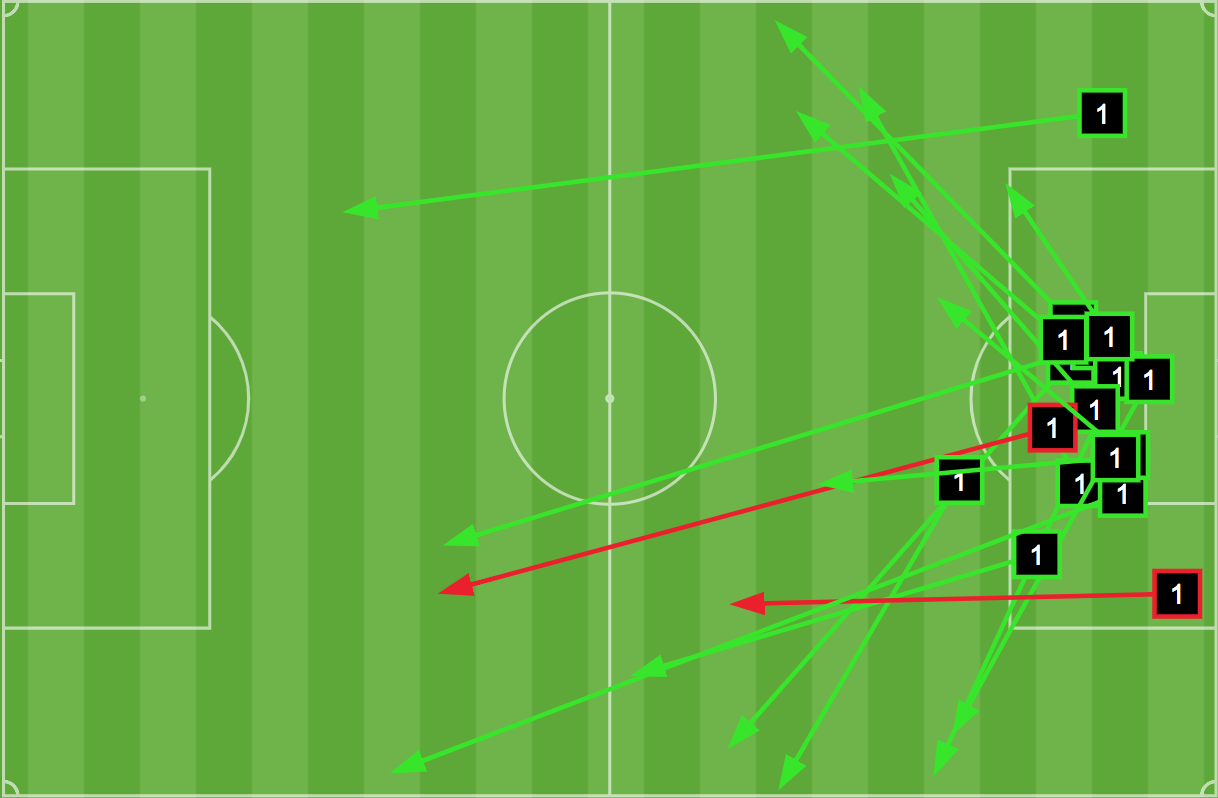Welcome back to Rising Tactics Recap, a weekly column where I attempt to provide insight to Phoenix Rising fans by breaking down some strategic and tactical observations from Phoenix’s latest match.
Phoenix Rising want their identity to be defined by how they play with the ball at their feet. They want to be a possession-based team that pushes numbers forward and passes through opposing teams on their way to goal.

“Our focus has always been to be a possession-oriented team,”
Head Coach Rick Schantz before Phoenix’s game against El Paso Locomotive.
In their first win of the season, Phoenix only had 37.5% possession. In every other game so far this season, Phoenix had more than 50% possession, but were winless.
On the surface, that looks like a problem. When a team who says their identity is possession soccer can’t seem to win a game when they have the majority of possession, it’s fair to ask questions. When that team gets their first win of the season playing mostly without the ball, it’s fair to ask questions.
Right now, Phoenix Rising are undergoing an evolution. They started out the season by keeping possession and scoring, but also suffering an obscene amount of goals. They were having attacking success, but their inability to stop transition attacks made that success a liability. Last week, Schantz put Collin Fernandez and Kevon Lambert, two active, mobile midfielders, in a double pivot and Phoenix kept their first clean sheet of the season.
Phoenix’s defense was much improved in their draw against Fresno, but their attack was unable to break down their opponent’s low defensive block. Fresno sat deep and conceded possession to Phoenix, daring them to penetrate their compact defense.
Over the first four weeks of the season, Phoenix Rising proved that they were capable of scoring goals or being solid defensively. One or the other, but not both. In order to mix goal-scoring with defensive solidity, Phoenix took a different approach to their game against El Paso. They didn’t try to inflate their possession numbers by holding on to the ball for long periods of time. Instead, they built their attacks on short, direct, meaningful sequences of possession.
Phoenix adapted their identity to mask some of their weaknesses and to fit the tactical demands of their game against El Paso. Because El Paso pressed high up the field, Phoenix pushed a lot of their attacks in behind the opposing defense. It sounds silly (given the massive wipeout), but you actually can see Phoenix Rising’s game plan on their first goal.
El Paso press to win the ball after they lose it and Phoenix immediately look to send their wingers in behind.
When they won the ball in their own half, Phoenix had a few patient possession sequences, but they did play a lot of direct balls into space for their attacking players to run on to. However, those direct balls appeared to be only part of the coaching staff’s plan. The main tactic that Phoenix Rising used against El Paso was extended defensive pressure.
Coming into this game, Phoenix undoubtedly knew that El Paso wanted to build from the back and move the ball progressively up the field. With that in mind, Phoenix pressed high during buildup and made their opponents uncomfortable playing out of the back.
Phoenix’s press was well-coordinated and well-executed by the forwards, midfielders, and defenders. The forward line was quick to close down the ball, the midfield covered ground and forced the opposition backwards, and the defense won aerial battles.
This sequence is an excellent example of Phoenix Rising’s front two lines (forwards and midfielders) working together to ruin El Paso’s buildup.
The buildup to Phoenix’s second goal is an even better example of the team’s overall defensive effort pressing and their attacking strategy.
After El Paso break through the first line of Phoenix’s pressure, Jason Johnson tracks back to win the ball and pokes it to Solomon Asante. Asante, Johnson, and José Aguinaga then combine to start a transitional attack that ends in a Ben Spencer goal.
Phoenix Rising’s latest tactical adaptation is all about meaningful possession.
Phoenix used their pressuring defense to create transitional possession opportunities. A week after failing to break down a low block, a game against an aggressive, bold opponent was exactly the type of game that Phoenix Rising needed. They didn’t have to use massive amounts of possession to break down a compact defense. Instead, they used active defending as a way to possess the ball in threatening, attacking areas.
The most recent evolution of Phoenix Rising and Rick Schantz’s tactical strategy has three points to its name.
Before we get into The Final Third, I want to make one thing clear: the fact that Phoenix kept the ball last week and failed to score and didn’t keep the ball much this week and won does not mean that we have seen the last of Phoenix Rising out-possessing opposing teams.
Phoenix will still have the majority of possession in a lot of games this season. In those games, we could very well see Phoenix’s identity evolve yet again to create meaningful chances in different ways.
Now for The Final Third:
- When Saturday’s lineup was released without Jon Bakero in the starting eleven, I raised my eyebrows. Bakero had been the team’s best chance creator in both of his starts so far this season. Then, after watching the game, I remembered how good José Aguinaga is and how much value he brings to a team. I’ve talked about it before: Aguinaga’s ability to keep the ball in tight spaces is a big reason why Schantz likes him so much.
- We knew it coming into the season, but Mustapha Dumbuya is more of a hindrance defensively than he is a help. He struggles with his positioning and is often a step too slow to close down attackers in wide areas. I believe Saturday’s game against El Paso was his best of the season, but Dumbuya can still improve a lot on the defensive end.
- Even though Collin Fernandez and Kevon Lambert were rock-solid again this week, it’s possible that we see a change in midfield on Wednesday against Austin. Austin doesn’t put much emphasis on keeping the ball, which means that Phoenix will likely have to break down a low block. That might necessitate rotating a more creative midfielder into the mix.
Thanks for reading this week’s edition of Rising Tactics Recap! Check back next week for more insight and analysis.




